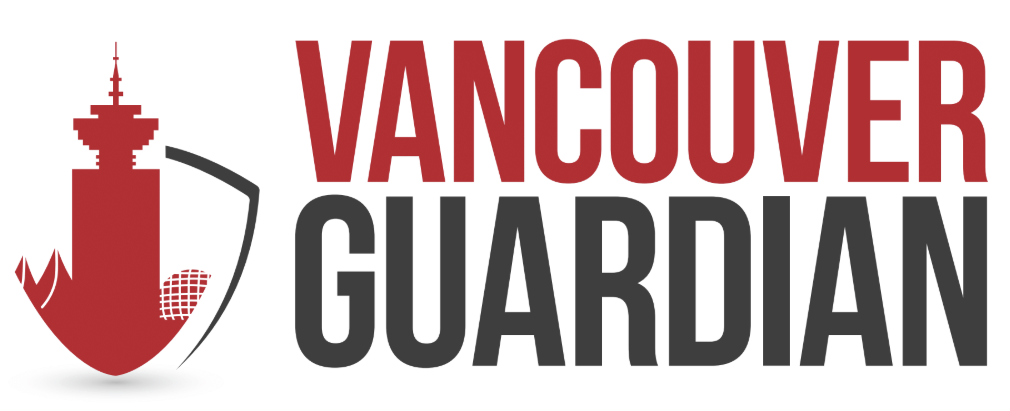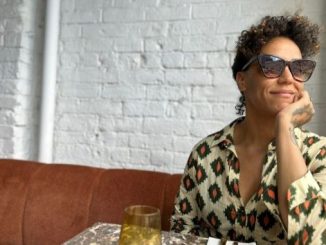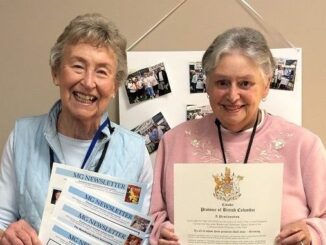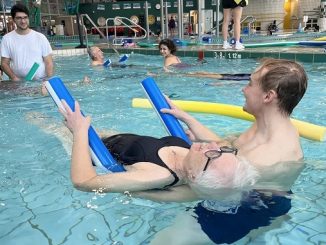VocalEye is the first live descriptive arts service for the blind in Canada. Their mission is to provide greater access to theatre, arts and cultural events for people of all ages who are blind and partially sighted. We spoke with Amy Amantea, Associate Director of VocalEye Descriptive Arts Society, to find out more about them.
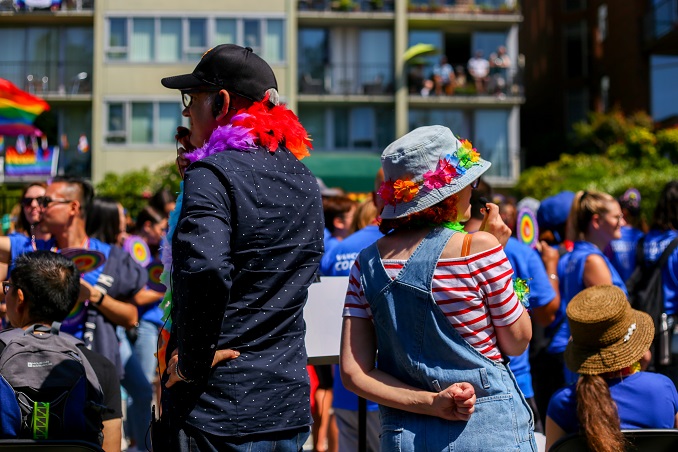
Describe your charity/non-profit/volunteer work in a few sentences.
VocalEye is the first live descriptive arts service for the blind in Canada. Our mission is to provide greater access to theatre, arts and cultural events for people of all ages who are blind and partially sighted. We provide theatre companies and other arts organizations with the support necessary to make their productions and events more accessible through live description, education, outreach and other services.
What problem does it aim to solve?
Theatre and arts and cultural events have limited access for people who are blind. There are multiple ways VocalEye addresses accessibility issues: by providing descriptions of visual aspects of art and culture, partnering with local theatre companies to provide accessible performances, offering services free of charge to individuals who are blind and partially sighted, offering virtual access to arts and cultural content as an alternative (or in addition to!) in-person events, providing ways for community to connect and engage, and by offering education and training to individuals, organizations, and access providers.
VocalEye reduces the barriers faced by the blind and partially sighted community by providing services that are free of charge. These services include Descriptions of staged theatre performances, parades, visual art, public art tours and more. Touch Tours are often available after stage performances so that blind theatregoers can experience the tactility of props, costumes and set décor. In order to address accessibility of patrons to and from the theatre, VocalEye offers highly trained Theatre Buddies who are available to assist as Sighted Guides, thus reducing barriers of navigation to and from a venue and once inside a venue. A ticket access program is also available which aims to reduce financial barriers to accessing the arts. Many social events are arranged after matinee performances, bringing community together in a social environment, thus reducing isolation and the fear of going to arts and cultural events alone.
A unique aspect of VocalEye programming is our virtual events, born out of the pandemic. This pivot to online content is popular within our community, as it offers the opportunity to experience art and culture from the comfort of home, as well as time to connect and chat with community, regardless of where people live. Our Almost Live events see guests visiting from all over Canada, the USA, and some as far as Japan and Australia. VocalEye Almost Live events are offered every Wednesday evening and is an online accessible arts adventure featuring described plays, audio plays, accessible virtual tours, explorations in Opera and pop culture content, festival highlights and so much more. Online programming is offered free to our patrons. The Almost Live events are recorded and hosted on the VocalEye YouTube Channel for guests to revisit or view later, and to build a repertoire of accessible content for community members to access at any time.
VocalEye also offers Professional Development to people who are experienced Describers, people who are interested in learning to describe and blind community members who are working to make a change in the art of description. These professional development opportunities are available online on a monthly basis and have special guest presenters that are doing interesting work in the area of description and access to arts and culture for blind audiences. Professional Development is offered free of charge in order to boost the quality of description and access that, in turn, serves a community of art goers who are blind and partially sighted. This group sees folks from all parts of Canada, the USA and as far as New Zealand. In addition to Theatre Buddy training, VocalEye also offers Sighted Guide Training to individuals and organizations, which teaches how to effectively and confidently assist a person who is blind or partially sighted in everyday situations. The training also includes an introduction to the principles of Disability Justice, practical guiding techniques, language, etiquette and simple scenarios. Training such as this addresses not only the physical barriers faced by folks who are blind and partially sighted but also the attitudinal barriers and discrimination faced by marginalized community members.
When did you start/join it?
Amy started as a volunteer and founding board member in 2012. After an acquired sight loss, Amy was delighted to learn about a service that offered her access to arts and cultural events – it was a dream to feel included in the arts and have equitable access to participating.
What made you want to get involved?
As a person who had acquired a sight loss at the age of 24, Amy had been an avid arts goer before her sight loss. When returning to the conventional theatre, Amy discovered that missing out on the action in a play and not understanding who the characters were, who was speaking when and to whom, and what the aesthetic was – well, an evening at the theatre was an expensive nap. It was boring and dull. What was the audience laughing at? Why were they gasping? What were they seeing that someone who is blind is totally missing out on? Family members would try to provide description from the seat beside her to the shushes of fellow audience members in proximity, leaving Amy (and her companion guest) feeling like they didn’t belong.
As Amy started to go to described arts and cultural events, she started to meet other blind people. Meeting community members relieved the feeling of isolation and she was able to build friendships and even learn blind hacks from people who had lived with blindness for much longer than she had. Amy has since grown with VocalEye into the role of Associate Director.
What was the situation like when you started?
When Amy started, VocalEye and the concept of described arts and culture was new to Vancouver. Theatre companies were asking why description was even necessary as the assumption was that blind people didn’t even go to the theatre. The Founder and Executive Director of VocalEye, Steph Kirkland, had invested in taking her training as a describer to the highest level. She sought out opportunities to learn from experienced describers about their work and about their methods of providing access to blind people in arts and cultural spaces. Travelling to London in the UK, New York City and Washington DC, Steph was able to bring back the best practices in creating a quality description service. There was then a relationship built with local blind community members to investigate what they wanted and needed to access arts and cultural events. Fundraising efforts to bring in the money, educating theatre companies and arts institutions of the access needs of the blind community and engaging blind people themselves to speak to their access needs has been an evolving practice within VocalEye, one that Steph Kirkland realized was important from the very beginning. Many in the blind community had never experienced live description, and this was also a big part of education and outreach.
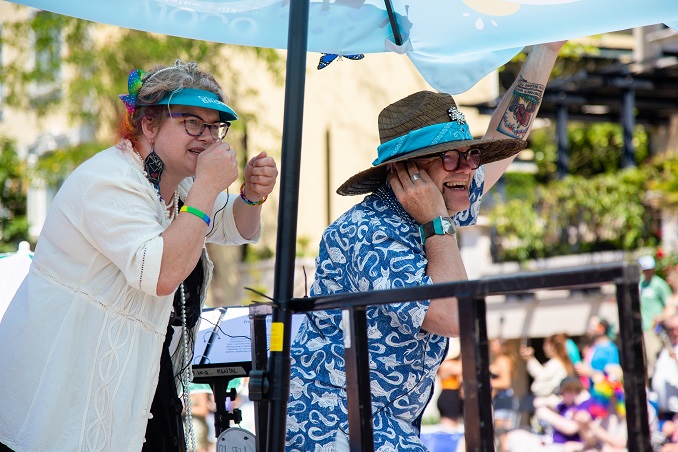
How has it changed since?
The demand today for audio description services has grown exponentially. There are many theatre companies, arts organizations and solo artists that are looking to make their content more accessible to the blind and partially sighted community. It is now becoming more mainstream for film and television to offer audio descriptions as well.
VocalEye has developed a model called “Low Vision Friendly”, which means that a particular theatre production can be understood about 90% based on dialogue alone, oftentimes with the support of some pre-show introduction notes outlining the costumes, characters, set design and perhaps a few visual moments that may be integral to the plot of the show. This is a great option for festivals as there are a myriad of shows available that may not lend themselves to traditional descriptions, mostly because they are only running for a short period of time. VocalEye can support these events by marketing to the community, creating a curated festival event with a group of blind patrons, and supporting artists to create their own pre-show introductions.
The benefit is that there is a lot more content that is made accessible. Training Describers is also something that VocalEye is facilitating, but this is a long and cultivated process. VocalEye wants to ensure that Describers are trained in a way that serves both the artistic work being described AND the listener – if the quality is poor, blind community members lose out. So, pumping out Describers is not the answer. In order to produce qualified Describers, VocalEye provides intensive training that also involves blind consultants, and each Describer works with VocalEye as a mentor for one year, to really learn the ropes from an experienced Describer – not only learning about the art of description but also how the entirety of the service is provided to the blind community. Description alone does not make an event accessible. VocalEye looks at the access to arts and cultural events from a holistic approach.
Today there is much more education about access for the blind, thanks in part to the work VocalEye has done (and continues to do). There is a more inclusive approach to the theatre experience and an aptitude to be more inclusive as an industry.
The Almost Live programming was a pandemic pivot. VocalEye wanted to make sure that our community wasn’t feeling isolated and trapped at home, and had artistic experiences and opportunities to connect as a community. We have been informed, loud and clear, by the community, that we cannot let go of the Almost Live programming. There are some people who join us that don’t have any access to arts and culture in their local area. To date we have hosted 107 Almost Live events…and counting.
The blind community continues to be actively involved in the growth of VocalEye, not just as art lovers, but also as stakeholders in the evolution of the organization.
What more needs to be done?
Accessibility is on a continuum, so there is still much work to be done. As all VocalEye programming is offered free of charge, (to reduce barriers to patrons who are blind/partially sighted), fundraising is an ongoing effort.
VocalEye also has ambitions to expand further: in the areas of creating podcasts (to support employment of the blind community and provide an artistic outlet); creating a pool of blind consultants who can support other businesses and organizations on access-related objectives; and addressing the transportation barrier that is faced by many blind community members.
VocalEye is also committed to the continued offering of professional development and training opportunities, contributing the ongoing work to make arts and culture as accessible as possible.
VocalEye continues to challenge assumptions that the mainstream population has of blind people and how they connect with the world and in particular arts and culture.
Most importantly perhaps, is putting the work in to listen to the needs of our community. VocalEye is responsive to the blind and partially sighted community and we want to continue addressing the access needs that the community identifies.
How can our readers help?
Monthly donations make a big impact and can help us continue to make theatre, arts and cultural events more accessible for people who are blind and partially sighted, online and in person. Monthly or one-time donations support both the VocalEye team and the community, making it possible for us to deliver Almost Live Zoom events, Community Workshops, Notable Socials, Describer Cafés and other programs free of charge. Donations can be made safely and easily on CanadaHelps, and a tax receipt will be provided for donations of $20 or more. Donate here.
If donating is not an option, helping to spread the word about our programming, following VocalEye on social media and sharing what we do also makes a huge impact. Your support, in all forms, is what keeps us going!
Do you have any events coming up?
VocalEye hosts weekly online events, every Wednesday evening at 6:30 pm Pacific Time. Almost Live events feature different special guests each week and offer a wide range of cultural content, from audio plays, opera, and music, to mural descriptions and more.
In addition, VocalEye, in partnership with the Arts Club Theatre, is hosting a free Community Workshop, Saturday, August 26, 2023, at 11 am Pacific Time, at the BMO Theatre Centre. Indigenous Drumming and Singing Circle:
Connecting in a Good Way! Is led by Indigenous educator, musician and artist Deanna Gestrin. The workshop is offered free to blind and partially sighted folks.
For all VocalEye events and workshops check here.
Where can we follow you?
Website | Facebook | Twitter | Instagram
PAY IT FORWARD: What is an awesome local charity that you love?
Realwheels Theatre
